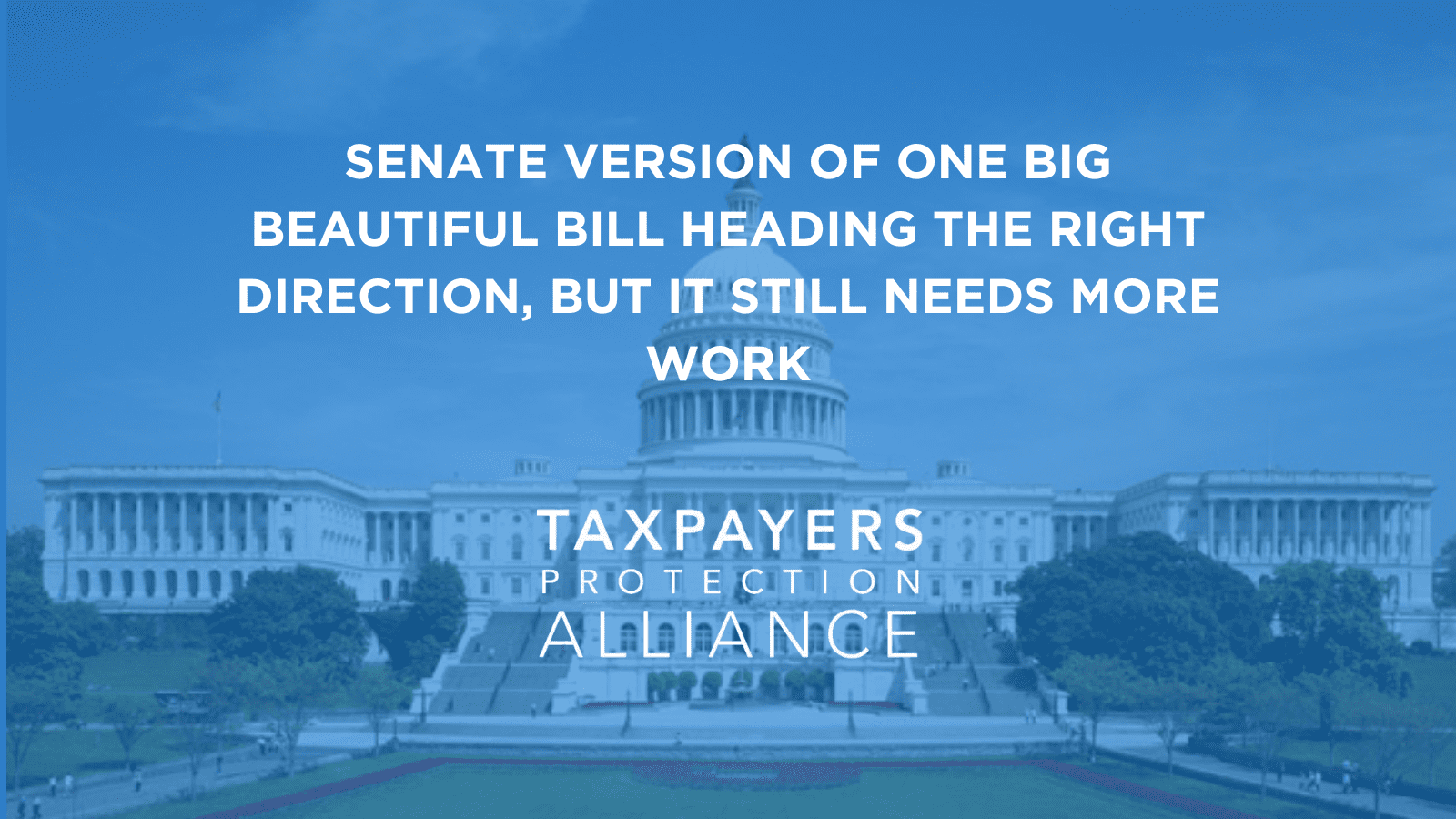
Senate Version of One Big Beautiful Bill Heading the Right Direction, but it Still Needs More Work
Taxpayers Protection Alliance
June 25, 2025
The Senate has released its version of the One Big Beautiful Bill Act (OBBBA), introducing various changes to the House of Representatives’ proposal as the bill goes through the reconciliation process. On some critical issues, the Senate version has improved upon the House version. However, despite these improvements, OBBBA still comes up short of achieving its objective of extending critical tax relief while addressing the nation’s pressing fiscal problems. Congress needs to pay close attention to the bill and tackle the hardest issues head-on, which will require significant time and arduous deliberation. Congress should not hamstring itself with unnecessary deadlines, which would rush the process and produce a subpar final product that will hurt taxpayers and businesses.
OBBBA Tax Reform Wins
OBBBA’s strongest group of proposals resides in its tax reform efforts, particularly in making permanent some of the landmark temporary provisions in the Tax Cuts and Jobs Act (TCJA). For example, it extends TCJA’s lower marginal income tax rates, extends and increases the standard deduction, caps or limits various itemized deductions, expands business expenses qualified for expensing, and increases the thresholds of assets considered under estate and gift taxes, among other measures. The key success of the TCJA was that it brilliantly simplified the tax code while providing significant tax relief for both businesses and individuals, fueling economic growth and improving taxpayers’ quality of life. The Senate version of OBBB would do much to extend the benefits for future generations of Americans.
More Tax Reform Work to be Done
Some proposals included in OBBBA could erase some of that progress. The introduction of provisions like no tax on tips, overtime, or Social Security are gimmicks and would unnecessarily add more complexity to the tax code, in direct contradiction of the objective of the TCJA. The Senate version has correctly identified the flaws in this proposal, adding significant caps and guardrails on these tax exemptions to the version delivered by the House. Additionally, the Senate curtailed the House proposal to raise of the State and Local Tax (SALT) deduction cap, reeling it back to its TCJA level. While this is progress, Americans would be better served by the elimination of these distortions and their replacement with broad-based tax reliefs. Alternatively, this revenue could be used to either shrink the deficit or service the nation’s ballooning debt.
Other misguided tax proposals from OBBBA are the introduction of remittance taxes, alongside the increases in endowment taxes and Section 899 taxes on foreign investment. These taxes could introduce burdensome compliance schemes (such as the remittance tax with the exemption for U.S. citizens), and others could generate significant disruptions for foreign investment in the U.S. and undermine charitable giving.
Mixed Record on Non-Tax Provisions
Aside from the tax provisions, OBBBA has been a mixed bag with respect to regulatory and spending reform. For example, the bill had initially pushed for an aggressive phaseout of the Inflation Reduction Act (IRA) and its onerous and distortionary tax credits. Undoing (or repealing) one of the most expensive bills in American history should be a major priority if Congress is serious about reducing spending and debt. Unfortunately, the Senate version of OBBBA goes with a more limited phaseout of the IRA.
The bill also would introduce egregious price controls through the Most Favored Nation (MFN) pricing model for medications. The MFN model would set international pricing benchmarks by linking reimbursement for high-cost medications for Medicare Part B to the lowest price paid by comparable nations. While failing to lower real costs for patients, MFN simultaneously threatens to stifle medical innovation. By arbitrarily capping reimbursement based upon international pricing, the MFN model undermines the United States’ global biopharmaceutical leadership. Reduced revenues and uncertainty will hamper critical investment in research and development, especially for treatments for rare and debilitating disease.
HSAs offer a “triple tax advantage” by allowing pre-tax contributions for individuals and families with high-deductible health plans (HDHPs), tax-free investment growth, and tax-free withdrawals when used for qualified medical expenses. HSAs are an excellent savings tool that enable Americans to save for health-related expenses throughout their lives. Some of the HSA provisions that were stripped from the Senate version include increased contribution limits, casting a wider net of patients, and broadening the definition of HSA qualified expenses. The HSA expansion provisions in the OBBB House passed version is an excellent step toward health care freedom and should be included in the final version of the bill.
Conclusion
As OBBBA goes into the last stretch of the reconciliation process for further negotiation, there are many opportunities for improvement. The tax reform backbone of the bill is largely positive, and some of its worst shortcomings are trending in the right direction. The upcoming negotiation will likely be arduous and lengthy, but policymakers should take their duty to taxpayers seriously and ensure that all the kinks have been worked out before enacting a final bill under an arbitrary deadline. Congress should dedicate the necessary time and resources during this last stretch, instead of rushing to present a flawed bill to the public.
